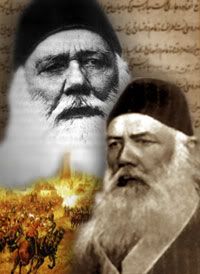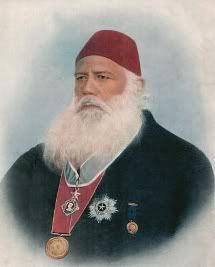Saad Qaisar
Today (October 17, 2008) marks the 191st birthday of Sir Syed Ahmed Khan (1817-1898).
 In the history of Indian Sub-Continent, the role Syed Sahib played for Muslims of India deserves golden words. Sir Syed was the most influential leader and social reformer of his time. He felt that the socio-economic future of Muslims was threatened by their orthodox aversions to modern science and technology. He made significant contributions in this regard that had long term implications for the Muslims of India that eventually lead to creation of state of Pakistan.
In the history of Indian Sub-Continent, the role Syed Sahib played for Muslims of India deserves golden words. Sir Syed was the most influential leader and social reformer of his time. He felt that the socio-economic future of Muslims was threatened by their orthodox aversions to modern science and technology. He made significant contributions in this regard that had long term implications for the Muslims of India that eventually lead to creation of state of Pakistan.
 Either it be his advocacy for Urdu to be recognized by British empire as second language of India & a symbol of Muslim heritage or establishment of a ‘Muslim Cambridge’ in form of MAO college at Aligarh, he is seen as a most vocal figure for the rights of Indian Muslims in the second half of 19th century under British Raj. At Aligarh, Sir Syed formed Scientific Society of Aligarh, the first scientific society of its kind in India that assembled Muslim scholars from across India, held annual conferences, disbursed funds for educational causes and regularly published a journal on scientific subjects in English & Urdu.
Either it be his advocacy for Urdu to be recognized by British empire as second language of India & a symbol of Muslim heritage or establishment of a ‘Muslim Cambridge’ in form of MAO college at Aligarh, he is seen as a most vocal figure for the rights of Indian Muslims in the second half of 19th century under British Raj. At Aligarh, Sir Syed formed Scientific Society of Aligarh, the first scientific society of its kind in India that assembled Muslim scholars from across India, held annual conferences, disbursed funds for educational causes and regularly published a journal on scientific subjects in English & Urdu.
His views, at times, challenged orthodox clergy who appeared averse to his message of ‘change’.
Today, as we find our nation amidst divergent schools of thought, when one segment of society is bent towards ultra-liberalism & appear to blindly follow western civilization, more of its bad than good and on other end, there are those who are hell bent to stick to age-old orthodox philosophy, do we await another Syed Sahib that would channelize our energies to the middle path. Or can we revive spirit of Syed Sahib’s life as a guideline in all the issues that confront us as a nation? Men like Syed Sahib are born once in decades, or perhaps, centuries! Are we ready to wait centuries for that to happen or reformulate our thought in-line with modern demands, choice is ours!
As Iqbal rightly put it:
aaen-e-nau say darna, tarz-e Kuhan pe aRna
manzil ye hi katthan hai, qaumoN kee zindagi meiN
‘To be afraid of modern ways, to get stuck on age old patterns, is the biggest hurdle in the life of Nations’.
Photo Credits: Khurram Ali Shafique and Wikipedia.com




















































If you are a Muslim from South Asia and can read this, then the credit goes Syed Ahmed Khan.
If you are a Muslim from South Asia and cannot read this, then the work is still unfinished. And miles to go before we sleep.
If you are a Pakistani or a Bangladeshi, you are reaping the dividends, even if they come with painful jolts by corrupt and inept leadership and ignorant mullahs.
As for the charge of rejecting ‘other texts of Islam” then he followed the path of Abu Bakr, Omar bin Khatab, Osman Ghani and Imam Ali. The Rashadeen did very well with just one Book for guidance.
As for the charge of secularlist; Qur’an is “the” secular Book of all faiths. That is why we “make no distinction” between messages and “leave it to Adil” to determine the truth. We merely compete for the good works.
As for the charge of Kufr; it is crime against Khalik alone and only judged by Malik alone. Those who make this charge exceed even the bounds of Rasool.
In the competition for “good works”, Syed Ahmed Khan did well.
Pakistan Zindabad
Pakistan Paindabad
Quraniyoun, or Ahle Quran are a sect who reject Hadith and rely completely on the Quran for religious guidance. More extreme people follow G. A. Parvez, who was a student of Iqbal and a senior civil servant. His orgnaization is called Toloue Islam. There was an older group, who followed a Maulvie Chakralvi.
Sir Syed Ahmad Khan was a rationalist, or a Naturalist. He wrote a commentary on Bible as well as Holy Quran. His students included Al-Farahi, who was the teacher of Amin Ahsan Islahi. Islahi was a colleague of Maudoodi during his formative years. Dr. Israr Ahmad and Javed Ghamidi regard Islahi in high esteem and claim to be his students. Islahi’s commentary of the Quran is a major influence on modern scholars of Islam.
Thus, Sir Syed’s influence on Pakistan is very deep and of an intricate nature. To blame him to be an innovator, we will have to closely scrtuanize Iqbal and Maudoodi as well.
The orthodoxy, both Deoband and Barelvi as well as Wahabi clerics love Iqbal. But Iqbal was critical of many orthodox views held dear by Indian muslims.
Anyone who reviles Sir Syed should look into history first. His reforms were of a very political and social nature. We owe the creation of Pakistan to him and we must be thankful for that. His religious views had influenced only a minority who split into different groups and caused more confusion for pakistani muslims. An unfortunate fact, but Sir Syed is not to be blamed for thinking rationally.
We are waiting for another one like him
Sir Syed Ahmed Khan was a great visionary and prorably one of the most misunderstood persons ever. His politics revolved around defending the rights of UP-Muslims (regional politics) and safe-guarding the interest of UP Muslims and UPites as a whole then anything else
After reading some of the comments about Sir Syed I have one advise and one comment. The advice is to read William Darymple’s The Last mogul to have an idea about what state the muslims were at that time. The second book is Hayat-e-javaid by Hali…
The comment is “Abu Jahal was not killed in Badar. He is alive, well and kicking ass in Pakistan.